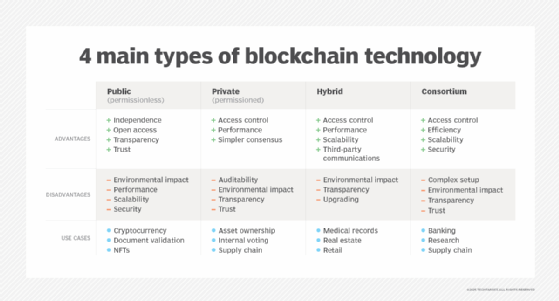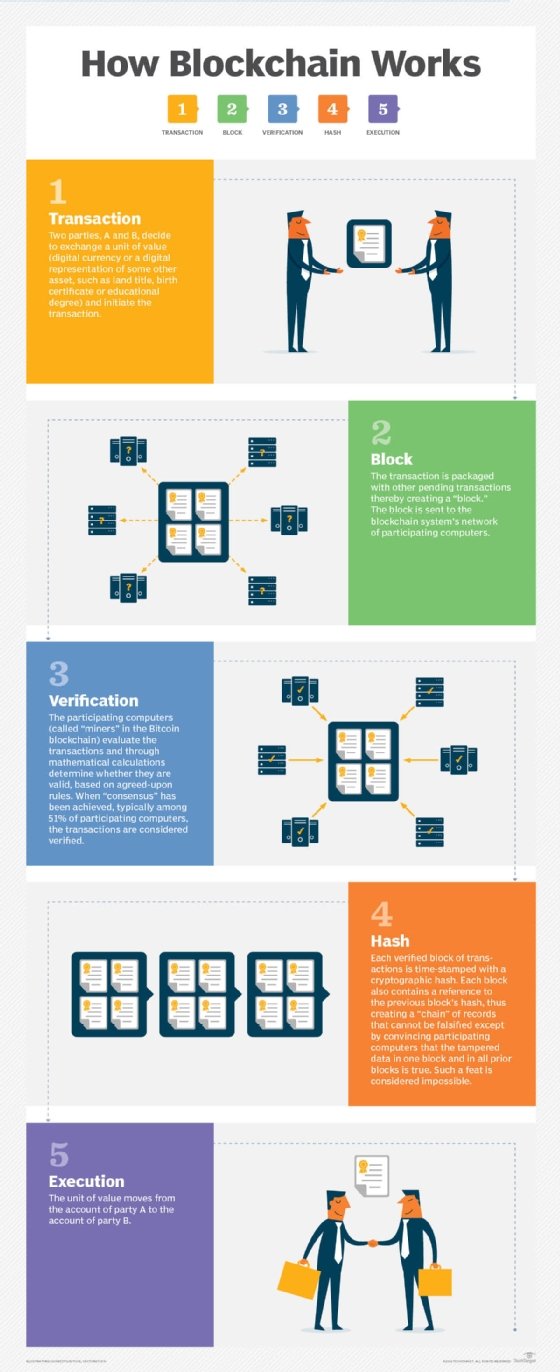8 top blockchain certification courses to pursue in 2021
What are the top blockchain certification courses?
We’ve compiled a list of eight of the best and more popular blockchain courses that address various types of blockchain business roles and provide students with a certificate for completing the course material and passing a certification exam.
1. Blockchain Technology (edX for Business)
Key elements: BerkeleyX’s Blockchain Fundamentals Professional Certificate program consists of two courses offered Prerequisites: Students are expected to have taken the previous course in the series, Cryptocurrencies: Bitcoin and the Crypto Space, or have similar experience and knowledge in this domain.
Registration details
2. Certified Blockchain Expert (Blockchain Council)
Key elements: This self-paced, 10-hour certification course provides a thorough understanding of blockchain technologies, mining and security practices. Students are presented with real-world use cases where blockchain technologies can be applied in various verticals such as finance, healthcare, insurance, government and telecommunications. Topics covered include the following:
- technologies that comprise blockchain;
- understanding the blockchain architecture and ecosystem;
- types of blockchain mining;
- blockchain security and privacy, including smart contracts and consensus algorithms; and
- blockchain use cases in various market verticals.
Prerequisites: For those interested in designing and building blockchain-based business applications for the private and public sectors.
Registration details
3. Certified Blockchain Security Expert (101 Blockchains)
Key elements: This self-paced, four-week certification course builds a theoretical and practical foundation of blockchain security, including coursework on existing and emerging threats, threat modeling, algorithm security and smart contracts. Since blockchain is still a relatively new concept in most industry and government verticals, a solid foundation in blockchain security ensures deployed blockchain technologies are operating securely. Topics covered include the following:
- blockchain structure basics;
- threat modeling and modeling frameworks;
- types of blockchain cryptography, including public keys and hash functions;
- consensus algorithm security using two popular blockchain algorithms;
- blockchain node and network security;
- smart contracts and associated vulnerabilities;
- testing the security of a blockchain system; and
- ensuring blockchain security best practices in enterprise settings.
Prerequisites: For professionals seeking greater focus on the security aspects of blockchain technologies, including blockchain developers, CIOs and IT managers; software architects, engineers and developers; and enterprise and cloud architects.
Registration details

4. Blockchain: Foundations and Use Cases (ConsenSys Academy and Coursera)
Key elements: This self-paced, five-week certification course provides an understanding of the business side of blockchain and associated blockchain technologies, including coverage of blockchain security basics, why businesses implement blockchain in traditional settings, supply chain and asset tracking use cases, and Bitcoin and Ethereum. Topics covered include the following:
- brief history of blockchain;
- the purpose of decentralization in blockchain;
- hash functions and public key cryptography;
- anatomy of a block and a blockchain;
- consensus mechanisms and trust frameworks;
- real-world blockchain use cases;
- smart contracts, cryptocurrency tokens, wallets and marketplaces; and
- types of blockchain platforms, architectures and extensions.
Prerequisites: For technology managers, developers and non-developers interested in a beginner-level introduction to blockchain.
Registration details
5. Blockchain Basics (LinkedIn Learning)
Key elements: Consisting of 11 self-paced introductory-level instructional videos, this blockchain certification program provides insights into the business implications of blockchain as well as benefits, risks, obstacles and use cases. Students earn a certificate of completion after they demonstrate their understanding of the content Prerequisites: For business leaders, IT management and data science roles.
Registration details
6. Blockchain Specialization (University at Buffalo and Coursera)
Key elements: Consisting of four self-paced specialization courses, this intermediate-level certification program provides a brief review of foundational blockchain concepts, the underpinnings of blockchain technologies, how to design, code and deploy decentralized applications and smart contracts, and blockchain ecosystems and permissioned blockchain architectures such as Hyperledger and Azure Blockchain. Topics covered include the following:
- blockchain core concepts;
- creating blockchain nodes on Ethereum;
- distributed ledgers and the trust model;
- hashing and cryptography foundations;
- smart contracts and decentralized applications; and
- several popular blockchain platforms.
Prerequisites: Knowledge of blockchain basics and at least one modern, high-level programming language.
Registration details

7. Blockchain Developer (Educative)
Key elements: Like the LinkedIn crash course on the basics of blockchain, this self-paced, fully text-based, six-hour certification program on blockchain development gets seasoned programmers up to speed on designing and deploying blockchain networks, Chaincode and blockchain applications. Topics covered include the following:
- blockchain basics and terminology;
- blockchain trust models and data structures;
- hash and cryptography functions;
- Bitcoin history, mining and value;
- Hyperledger networks, transaction processes and development tools;
- how to deploy a fabric network;
- writing and deploying Chaincode; and
- creating and deploying a client application.
Prerequisites: For programmers and engineers who want to develop expertise in blockchain technology with Hyperledger Fabric specialty.
Registration details
8. Basics of Blockchain with Python (Codecademy)
Key elements: This self-paced, two-hour certification course provides an introductory overview of blockchain and common terminology, the structure and properties of the blockchain and individual blocks that comprise it, and the features providing security between different blockchain participants. The program also allows students to build a blockchain library using Python as well as create and tamper with blocks through interactive simulation. Topics covered include the following:
- how blockchain networks work;
- hashing and cryptography;
- creating a blockchain using Python;
- how to use a hash function using Python;
- generating block hashes; and
- verifying blockchain integrity and hacking the chain.
Prerequisites: Some knowledge of Python, but not necessary for most of the course.
Registration details
